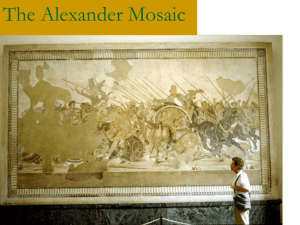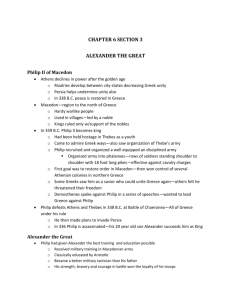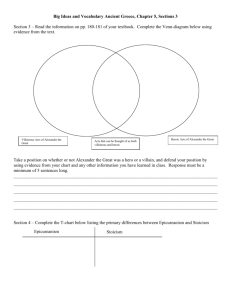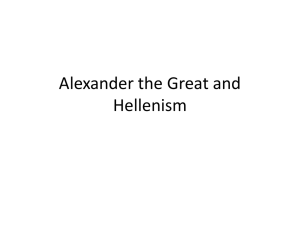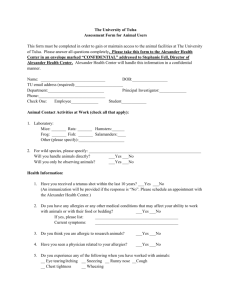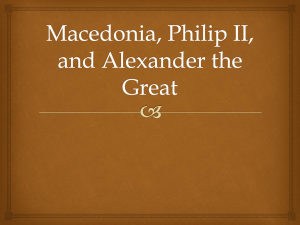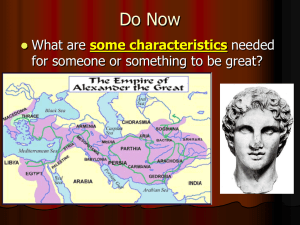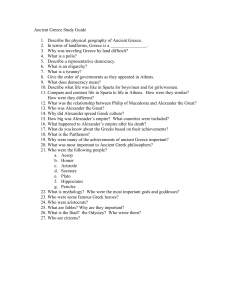Alexander the Great and Hellenism
advertisement
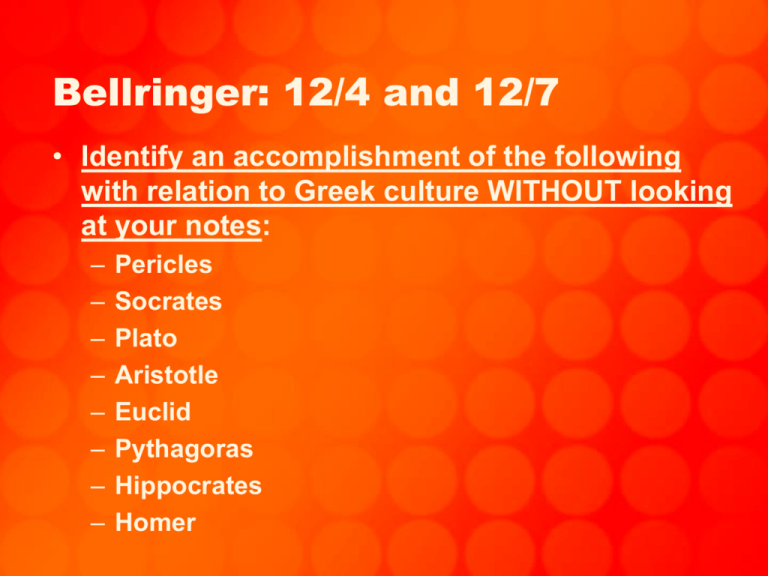
Bellringer: 12/4 and 12/7 • Identify an accomplishment of the following with relation to Greek culture WITHOUT looking at your notes: – – – – – – – – Pericles Socrates Plato Aristotle Euclid Pythagoras Hippocrates Homer After quiz: • Make these Table of Contents Updates: – 69: Quiz: Greek Culture – 70: Notes: Alexander the Great and Hellenism – 71: Study Guide: Greece Unit Test • Work on the “reading check” worksheet in the back (not graded) as a review of your HW reading. Do this from memory, don’t use your notes. See what you can recall. Homework: • Review study guide and begin studying for your Greece Unit Test! – Thursday (12/10) for 3rd Block – Friday (12/11) for 5th/8th Blocks • We will have a review day NEXT CLASS. Make sure you’ve reviewed your study guide so you have questions to ask if necessary and so you can do well on the review games! Alexander the Great and Hellenism Macedonia Setting the Stage: Philip II • Ruled Macedonia from 359336 B.C. and transformed it into a powerful military machine • Moved into northern Greece and met little resistance due to residual effects of Peloponnesian War – By 338 he had Greece under his control Movement of Philip II Alexander the Great Takes Power • Philip intended to use Greece as a launching pad to invade Persia, but he was assassinated before he could begin his plan • Instead the invasion of Persia would be left for Philip’s son Alexander who was just 20 when Philip was assassinated – “Alexander inherited from his father the most perfectly organized, trained, and equipped army of ancient times.” • J.F.C. Fuller, The Generalship of Alexander the Great Conquests of Alexander • Ionia and Anatolia • Syria, Palestine, Egypt • • • • • • Mesopotamia Persepolis (Iraq) King of Persia India Returns to Susa Dies (age 33) 333 332 331 331 330 327 324 323 Warfare in the Age of Alexander • Phalanx: A formation of infantry carrying overlapping shields and long spears – Adopted by Philip and Alexander – Greek in origin Warfare in the Age of Alexander • Hoplite – The main warrior of the Macedonian army. – Worked mainly in the tight phalanx formation, creating impregnable lines that often left the enemy demoralized. Hoplites in Action Warfare in the Age of Alexander • Sieges = surrounding and blockading of a town or fortress by an army trying to capture it. • A variety of weapons were built to hurl projectiles over city walls, scale or batter the walls, and transport soldiers over them. Tyre • Old city in the Eastern Mediterranean that was abandoned • New city built on an island two miles long and separated from the coast by a half mile channel – Walls were 150 feet high Tyrian Fire Ship Burns the Towers Tyre • Alexander collected a fleet of over 200 ships and maneuvered them into moorings off the harbors • Blockaded the Tyrian fleet in its harbors lays it under siege – Will use his siege engines to overpower the city’s walls No. of ships Origin 80 Sidon, Aradus, and Byblus 10 Rhodes 3 Soli and Mallus 10 Lycia 1 Macedon 120 Cyprus Tyre • After a seven month siege, Tyre fell • 8,000 Tyrians were killed in the fighting – 2,000 more were hung afterwards • Only 400 Macedonians were killed in the siege and just 20 in the assault Battle at Gaugamela • Darius III had assembled a huge army from all the Persian nationalities – Estimates range from 200,000 to a million infantry and 45,000 to 100,000 cavalry – 200 scythed chariots – 15 elephants • Alexander had about 40,000 men Darius III, King of Persia 336-330 B.C. Gaugamela (Arbela) • Alexander advanced and camped within sight of Darius’s army on Sept 30, 331 B.C.E. • In the opening moves of the battle, the Persians tried to outflank Alexander; will then retreat – Larger force had given them this capability • Alexander pursued for 70 miles to Arbela (modern day Arbil) but couldn’t catch Darius • Result: – Macedonian (Hellenic) victory – The Persians lost 40,000 to 90,000 – The Macedonians only 500 After Gaugamela • Darius’s escape frustrated Alexander because it prevented him from full claim to being king of Persia • Eventually Darius’s followers assassinated him • As Alexander continued to advance east, he took on an increasingly Eastern attitude – Worries his fellow Macedonians The End of the Empire • Alexander… – Married an “Eastern” woman – Adopted Eastern dress and habits – Publicly insisted upon his descent from the gods – Began giving key positions to Persians • The Macedonians resented the changes in Alexander’s behavior want to mutiny • Alexander died in June 323 BCE – Poisoned? Typhus? Meningitis? "The Marriage of Alexander the Great and Roxanna" by Ishmail Parbury After Alexander • After Alexander died, his generals jockeyed for power and by 275 they had divided up his kingdom into three large states – 1. Greece and Macedonia (Antigonus) – 2. Egypt (Ptolemy) – 3. Persia (Seleuces) – The period of Alexander and his successors is called the Hellenistic period to reflect the broad influence of Greek culture beyond Greece’s borders HELLENISM Background Information • Hellenism/Hellenistic culture - The blending of Greek cultures with those of Persia, Egypt, and Central Asia following the conquests of Alexander the Great. • Accomplished through: – Best way to encourage cultural exchange is through marriage. – Another great way to gain cultural exchange is through trade and education. Hellenistic Culture: Architecture and Sculpture • Architecture & Sculpture – The founding of new cities presented new opportunities for architects & sculptors – EX: Alexandria in Egypt – Characteristics: Emotional, exaggeration, sensationalism in art and sculpture (a departure from classical Greek styles) – Emotional Hellenistic Culture: Literature • Writing = held in high esteem • Popular genres: comedy, poetry, prose – Appolonius famous Hellenistic epic poet – Polybius scientific historian – Very few tragedies written, mostly comedies – Naturalism over satire Hellenistic Culture: Science and Mathematics • Archimedes – Discovered specific gravity by observing the water he displaced in his bath • Aristarchus – Proposes Heliocentric Universe (Sun at center of universe) won’t be proven until the Scientific Revolution of the 15th century CE • Eratosthenes – Determined the earth was round. – Calculated the Earth’s circumference to be 24,675 miles…he wasn’t very far off! Hellenistic Culture: Philosophy – Cynicism • Rejected the ideas of pleasure, wealth, Instead, they should live according to nature. Withdrew from society. • Followers gave away possessions and became vagrants or wanderers. They were like homeless people in today’s society. – Epicureans • Sought out pleasure, developed close friendships with those that shared similar beliefs • Pleasure- Good • Pain- Bad or Evil – Stoicism • Placed emphasis on reason, self-discipline, emotional control, and personal morality.
